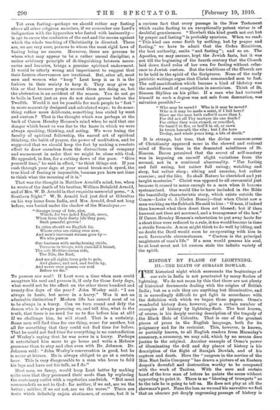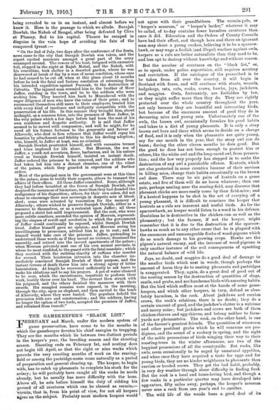HISTORY BY FLASH OF LIGHTNING. III. — THE DEATH OF . SURAJAH DO
VVLAH.
THE historical night which surrounds the beginnings of our rule in India is not penetrated by many flashes of lightning. We do not mean by this that there are not plenty of historical documents dealing with the origins of British India; but as a rule they are anything but illuminative, and it is exceedingly difficult to get light in accordance with the definition with which we began these papers. Orme's wonderful history does, however, give a certain number of examples of history by lightning-flash. The best known, of course, is his deeply moving description of the tragedy of the Black Hole of Calcutta. That is one of the greatest pieces of prose in the English language, both for its poignancy and for its restraint. This, however, is known, or partially known, to all English readers from Macaulay's summary, a summary, we may add, which by no means does justice to the original. Another example of Orme's power of illuminating the dull and dry places of history is his description of the flight of Surajah. Dowlab, and of his capture and death. Here the "surgeon in the service of the Hon. East India Company " has drawn .a picture of an Eastern despot's downfall and destruction worthy to be compared with the work of Tacitus. With the sure and certain hand of the true man of letters he paints the scene without appearing to paint it. There is no "blowing of trumpets" as to the tale he is going to tell us. He does not play at all the showman's part. None the less, as we read his narrative we feel that an obscure yet- deeply engrossing passage of history is being revealed to us in an instant, and almost before we know it. Here is the passage to which we allude. Surajah Dowlah, the Nabob of Bengal, after being defeated by Clive at Plassey, fled to his capital. Thence he escaped in disguise in the vain hope of avoiding the fate of the conquered tyrant :— " On the 2nd of July, two days after the conference of the Seats, news came to the city that Surajah Dowlah was taken, and the report excited murmurs amongst a great part of the army encamped around. The rowers of his boat, fatigued with excessive toil, stopped in the night at Rajah Mahal, and the Nabob, with his concubine, took shelter in a deserted garden, where he was discovered at break of day by a man of mean condition, whose ears he had caused to be cut off, when at this place about 13 months before he took the fatal and furious resolution of returning from his intended expedition against Purneah, to the destruction of Calcutta. The injured man revealed him to the brother of Meer Jaffier, residing in the town, and ho to the soldiers who were seeking him. They hurried him back to Muxadavad with the eager diligence of men who knew the value of their prize ; and to recommend themselves still more to their employers, treated him with every kind of insolence and indignity compatible with the preservation of his life. In this manner they brought him, about midnight, as a common felon, into the presence of Meer daffier, in the verywhich a few days before had been the seat of his own residence and despotic authority. It is said that Jaffier seemed to be moved with compassion ; and well he might, for he owed all his former fortunes to the generosity and favour of Allaverdy, who died in firm reliance that Jaffier would repay his bounties by attachment and fidelity to this his darling adoption; who, himself, to Jaffier at least, was no criminal.
Surajah Dowlah prostrated himself, and with excessive tremor and tears implored for life alone. But Meerum, the son of Jaffier, a youth not seventeen, fierce, barbarous, and in his nature cruel as Surajah Dowlah himself, insisted on instant death. Jaffier ordered the prisoner to be removed, and the soldiers who had taken led him into a distant chamber, one of the vilest of the palace, which they guarded in expectation of further orders.
Most of the principal men in the government were at this time in the palace, some to testify their respects, others to transact the affairs of their offices. All these Daffier consulted. Some, although they had before trembled at the frown of Surajah Dowlah, now despised the meanness of his nature, more than they had dreaded the malignancy of his disposition; others, for their own sakes, did not chuso to encourage their new sovereign in despotic acts of blood- shed ; some were actuated by veneration for the memory of .Allaverdy ; others wished to preserve Surajah Dowlah, either as a resource to themselves, or as a restraint upon Jaffier ; all these proposed a strict but mild imprisonment. But the rest, who were more subtle courtiers, seconded the opinion of Meerum, represent- ing the risques of revolt and revolution to which the government of Jaffier would continually be exposed, whilst Surajah Dowlah lived. Jaffier himself gave no opinion•' and Meerum seeing his unwillingness to pronounce, advised him to go to rest; and he himself would take care of the prisoner. Jaffier, pretending to understand these words as if they meant no violence, dismissed the assembly, and retired into the inward apartments of the palace ; when Meerum privately sent one of his own menial servants, in whom he most confided, to the guard with the fatal mandate ; which they received with the ruthless alacrity of ruffians who murder for reward. Their boisterous intrusion into the chamber im- mediately convinced Surajah Dowlah of their purpose, and the instant terrors of death threw him into a strong agony of bitter lamentation. At length he recovered sufficiently to ask leave to make his ablutions and to say his prayers. A pot of water chanced to be near, which the executioners, impatient to perform their work, hastily threw over his head. The servant then struck with his poignard, and the others finished the massacre with their swords. His mangled remains were exposed, in the morning, through the city, upon an elephant, and then carried to the tomb of Allaverdy, where they were buried. The populace beheld the procession with awe and consternation ; and the soldiery, having no longer the option of two lords, accepted the promises of Jaffier, and refrained from tumult."









































 Previous page
Previous page